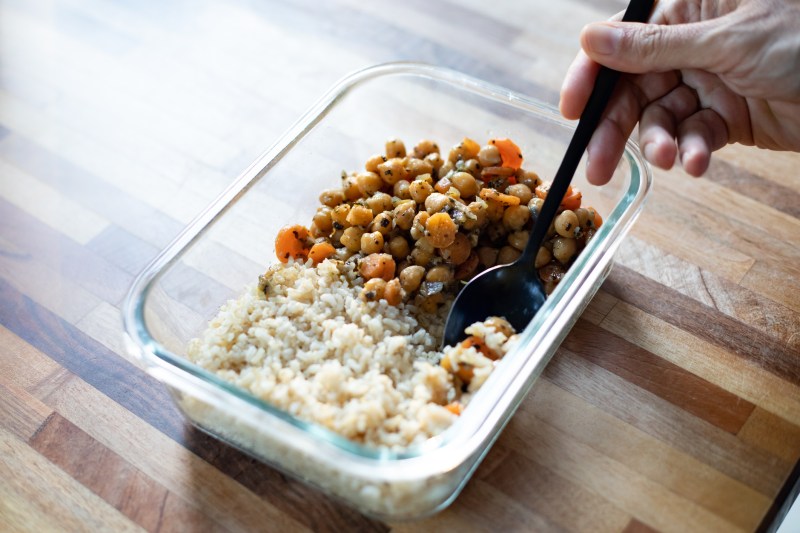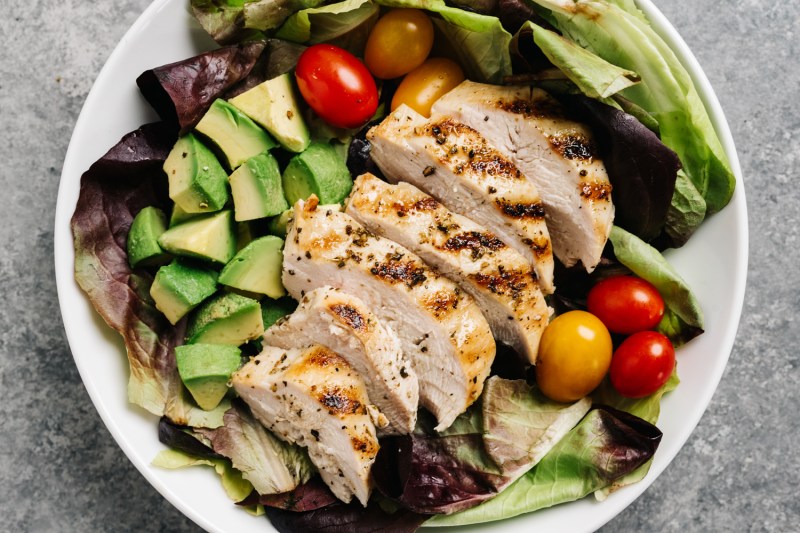When it comes to dieting, carbohydrates and fat get most of the attention. But what about protein? There are numerous benefits of protein, and consistently eating enough of it could result in you seeing new and improved results both in and out of the gym!
New diets have been invented regularly that challenge this idea of a balanced diet. These new diets are tailored toward diabetes management or are simply for those who would like less body fat and more lean muscle mass. This is where high-protein diets can help, and doing things like cutting certain carbs can also prevent or stop diabetes in its tracks.
What is protein, and what makes a meal high protein?

Protein is abundant throughout our bodies and provides the building blocks for muscle, hair, skin, bone, and body tissue in general. Even hemoglobin, which carries oxygen throughout the body via the bloodstream, relies on protein.
Protein encompasses 22 amino acids, and the nine essential amino acids, including histidine and lysine, must come from the foods we eat. A daily supply is needed for the body to function correctly, and protein aids in wound healing, the production of cells, and the growth and repair of muscles. It is also the catalyst for the production of enzymes and hormones, and it helps with many other bodily functions.
An inadequate supply of protein can result in muscle loss, general weakness, and malnutrition. However, most people in the Western world have access to adequate amounts of protein-containing foods, and malnutrition from protein deficiency is rare.
If you follow a high-protein diet, a typical meal will not be balanced. Instead, the scales would tip in favor of high-protein-containing foods, such as meat, fish, legumes, beans, and eggs. These would be consumed at the expense of carbs like bread, rice, pasta, and vegetables. In addition, foods high in healthy fats like avocados, olive oil, and cheese would also be put on the back burner.
Although your meals should be balanced, many people thrive from including more protein in their diet. Take a look at these five reasons why a high-protein diet may be right for you.
5 benefits of protein

1. Muscle building
Muscles rely on protein supplies to grow and repair. The more protein that can be utilized, the more efficient this process becomes. If you throw in some regular exercise, the results will eventually become visible faster as your muscle mass increases and your muscles become more toned and defined.
High-quality protein from foods like chicken breast, fish, and pulses is best for building and maintaining muscle profile. Once muscle definition is improved, a daily adequate amount of protein will help prevent any muscle loss from occurring.
2. Metabolism booster and fat burner
Eating a high-protein diet can help kickstart a sluggish metabolism. A slow metabolism can result in weight gain and increased body fat storage. This is caused by slow or inadequate calorie burning, allowing extra calories to be stored as fat.
An added benefit of a high-protein diet is that protein-containing foods tend to have a very low glycemic index score. This means that they do not raise blood sugar levels significantly when eaten; therefore, less insulin is needed to bring down blood sugar levels after every meal.
The continuous need for large amounts of insulin to be released when eating simple carbs daily can result in weight gain and increased body fat storage. Mixing proteins with carbs can help lower this risk.
3. Weight loss
Simple carbohydrate-containing foods come loaded with calories. Furthermore, they score highly on the glycemic index, and regular consumption can lead to insulin resistance and type 2 diabetes. Another consequence of a diet that is primarily carbohydrates and fats is that weight gain comes around easier. Protein has the highest thermic effect of all three macronutrients, and this means that your body has to work harder to digest it and burns extra calories while doing so, promoting the maintenance of a healthy weight.
If the tables are turned and more quality protein is consumed, this automatically cuts down on calorie, fat, and sugar intake. Increasing your high-quality protein consumption is one of the easiest ways to succeed on a weight loss journey!
4. Reduced hunger and cravings
The biggest complaint by any dieter is that they are constantly left feeling hungry on their eating plan. This is not the case with high-protein diets, as hunger and cravings are controlled far better than most other types of diets.
Diets that include plenty of carbs often create poor blood sugar control with fast spikes and even quicker falls in blood glucose levels. These sudden decreases in blood sugar levels caused by insulin lead to hunger and cravings for anything that can raise blood glucose levels once more.
Even if you are not trying to lose weight and simply want to feel fuller for longer, then a high-protein diet can help because protein is the most satiating macronutrient. Not only does it offer better blood glucose control, but high-protein diets also reduce the level of the hunger hormone ghrelin in our bodies.
5. Cholesterol control
Cholesterol is a fatty substance made by the liver and found in every cell of the body. HDL is considered good cholesterol, while LDL is far less desirable, and levels of this form of cholesterol need to be kept low.
It is thought that high-protein diets directly affect cholesterol levels, raising HDL levels and dropping LDL cholesterol. This is most likely because those on a high-protein diet are less likely to eat foods loaded with sugar and saturated fats. These individuals are also less likely to have poor blood sugar control. Obesity tends to be lower in this group as well.
High-protein foods to add to your diet

High-protein diets do not need to be bland just because they are lower in fat, carbs, and sugar. Many high-protein foods are both delicious and healthy! While you may want to dive right in with these tasty foods, increase your protein intake slowly so your body has time to adapt. Here are some of the best high-protein foods you may want to introduce into your diet slowly.
- Chicken breast is fat-free and high in protein, and a 200-gram serving contains 62 grams of protein.
- Fresh Mackerel is high in healthy omega-3 fatty acids and protein, and 100 grams contains 19 grams of protein.
- Chickpeas are full of fiber and a great source of protein for vegetarians, and 100 grams contains 19 grams of protein.
- Lean steak is a good source of highly absorbable iron, and its protein content is impressive too! 100 grams contains 25 grams of protein
- Eggs contain vitamins such as B12 and Vitamin D, and 100 grams contain 13 grams of protein. Making eggs is a quick and tasty way of getting a protein boost!
Should you follow a high-protein diet?

Protein is vital to the body and is required for many different bodily functions. Everyone has different daily protein requirements depending on age, weight, and lifestyle.
However, individuals on high-protein diets that allow them to eat more protein than the daily allowance states can experience many benefits, such as weight loss, increased muscle mass, lower body fat percentages, and reduced chances of developing diabetes.



